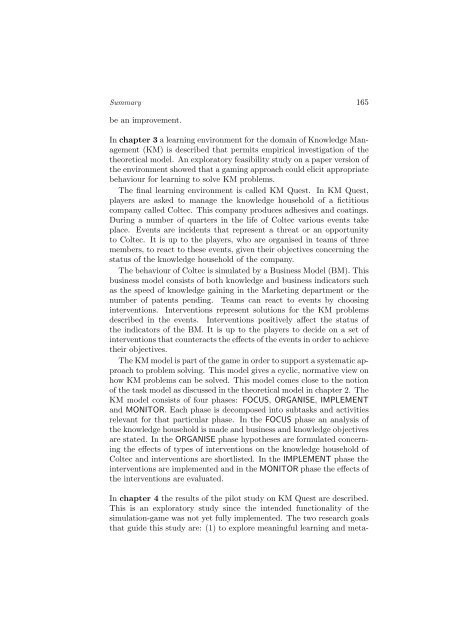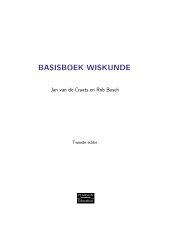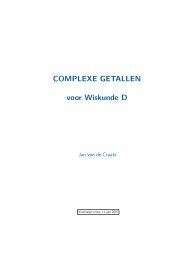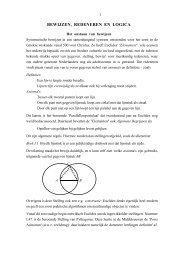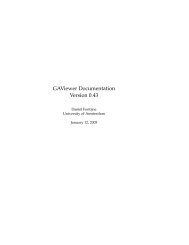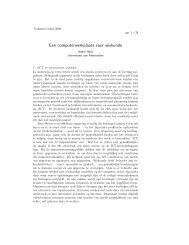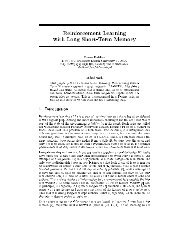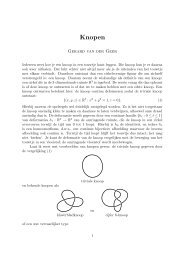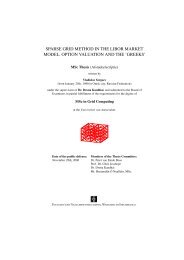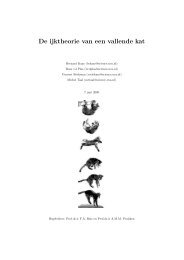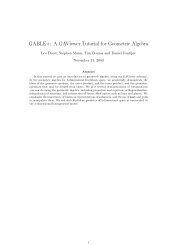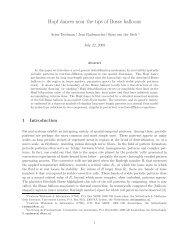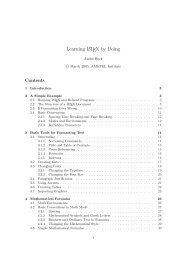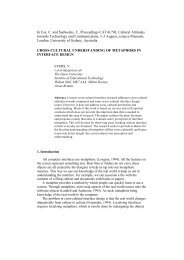The role of metacognitive skills in learning to solve problems
The role of metacognitive skills in learning to solve problems
The role of metacognitive skills in learning to solve problems
You also want an ePaper? Increase the reach of your titles
YUMPU automatically turns print PDFs into web optimized ePapers that Google loves.
Summary 165<br />
be an improvement.<br />
In chapter 3 a learn<strong>in</strong>g environment for the doma<strong>in</strong> <strong>of</strong> Knowledge Management<br />
(KM) is described that permits empirical <strong>in</strong>vestigation <strong>of</strong> the<br />
theoretical model. An explora<strong>to</strong>ry feasibility study on a paper version <strong>of</strong><br />
the environment showed that a gam<strong>in</strong>g approach could elicit appropriate<br />
behaviour for learn<strong>in</strong>g <strong>to</strong> <strong>solve</strong> KM <strong>problems</strong>.<br />
<strong>The</strong> f<strong>in</strong>al learn<strong>in</strong>g environment is called KM Quest. In KM Quest,<br />
players are asked <strong>to</strong> manage the knowledge household <strong>of</strong> a fictitious<br />
company called Coltec. This company produces adhesives and coat<strong>in</strong>gs.<br />
Dur<strong>in</strong>g a number <strong>of</strong> quarters <strong>in</strong> the life <strong>of</strong> Coltec various events take<br />
place. Events are <strong>in</strong>cidents that represent a threat or an opportunity<br />
<strong>to</strong> Coltec. It is up <strong>to</strong> the players, who are organised <strong>in</strong> teams <strong>of</strong> three<br />
members, <strong>to</strong> react <strong>to</strong> these events, given their objectives concern<strong>in</strong>g the<br />
status <strong>of</strong> the knowledge household <strong>of</strong> the company.<br />
<strong>The</strong> behaviour <strong>of</strong> Coltec is simulated by a Bus<strong>in</strong>ess Model (BM). This<br />
bus<strong>in</strong>ess model consists <strong>of</strong> both knowledge and bus<strong>in</strong>ess <strong>in</strong>dica<strong>to</strong>rs such<br />
as the speed <strong>of</strong> knowledge ga<strong>in</strong><strong>in</strong>g <strong>in</strong> the Market<strong>in</strong>g department or the<br />
number <strong>of</strong> patents pend<strong>in</strong>g. Teams can react <strong>to</strong> events by choos<strong>in</strong>g<br />
<strong>in</strong>terventions. Interventions represent solutions for the KM <strong>problems</strong><br />
described <strong>in</strong> the events. Interventions positively affect the status <strong>of</strong><br />
the <strong>in</strong>dica<strong>to</strong>rs <strong>of</strong> the BM. It is up <strong>to</strong> the players <strong>to</strong> decide on a set <strong>of</strong><br />
<strong>in</strong>terventions that counteracts the effects <strong>of</strong> the events <strong>in</strong> order <strong>to</strong> achieve<br />
their objectives.<br />
<strong>The</strong> KM model is part <strong>of</strong> the game <strong>in</strong> order <strong>to</strong> support a systematic approach<br />
<strong>to</strong> problem solv<strong>in</strong>g. This model gives a cyclic, normative view on<br />
how KM <strong>problems</strong> can be <strong>solve</strong>d. This model comes close <strong>to</strong> the notion<br />
<strong>of</strong> the task model as discussed <strong>in</strong> the theoretical model <strong>in</strong> chapter 2. <strong>The</strong><br />
KM model consists <strong>of</strong> four phases: FOCUS, ORGANISE, IMPLEMENT<br />
and MONITOR. Each phase is decomposed <strong>in</strong><strong>to</strong> subtasks and activities<br />
relevant for that particular phase. In the FOCUS phase an analysis <strong>of</strong><br />
the knowledge household is made and bus<strong>in</strong>ess and knowledge objectives<br />
are stated. In the ORGANISE phase hypotheses are formulated concern<strong>in</strong>g<br />
the effects <strong>of</strong> types <strong>of</strong> <strong>in</strong>terventions on the knowledge household <strong>of</strong><br />
Coltec and <strong>in</strong>terventions are shortlisted. In the IMPLEMENT phase the<br />
<strong>in</strong>terventions are implemented and <strong>in</strong> the MONITOR phase the effects <strong>of</strong><br />
the <strong>in</strong>terventions are evaluated.<br />
In chapter 4 the results <strong>of</strong> the pilot study on KM Quest are described.<br />
This is an explora<strong>to</strong>ry study s<strong>in</strong>ce the <strong>in</strong>tended functionality <strong>of</strong> the<br />
simulation-game was not yet fully implemented. <strong>The</strong> two research goals<br />
that guide this study are: (1) <strong>to</strong> explore mean<strong>in</strong>gful learn<strong>in</strong>g and meta-


